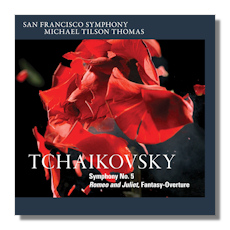
The Internet's Premier Classical Music Source
Related Links
- Tchaikovsky Reviews
- Latest Reviews
- More Reviews
-
By Composer
-
Collections
DVD & Blu-ray
Books
Concert Reviews
Articles/Interviews
Software
Audio
Search Amazon
Recommended Links
Site News
 SACD Review
SACD Review
Piotr Ilyitch Tchaikovsky

- Symphony #5 in E minor, Op. 64
- Fantasy Overture in B minor "Roméo and Juliet"
San Francisco Symphony/Michael Tilson Thomas
San Francisco Symphony Media SACD 821936-0062-2 Hybrid Multichannel
Oh my goodness, what happened here? Once an exciting and persuasive advocate of Tchaikovsky, Michael Tilson Thomas turns in a bore of a program with his San Francisco forces. Really, my initial impressions are so disappointing that I wonder how this disc was released at all. For the most part, the playing and sound are very good. Everything else is a real chore, and it's a shocker given the source.
From the very opening of the Symphony, there are red flags. Tilson Thomas begins the opening very slowly. This would be no problem if the opening phrases weren't so pointlessly micromanaged. The music stops and starts all over the place as the conductor tries to make point after point in music that should simply "go". It sounds labored. The winds are fabulous, while the strings have all of Ormandy's heaviness with none of the late conductor's tension and inevitability. It's Karajan, but much worse. In fact, it takes Thomas nearly half a minute longer than Ormandy to get to the march theme (2:55 or so) and it shows. Unsmilingly and with plenty of drag, the first movement holds as little excitement as it can.
The second movement is very, very dark and heavy. The horn solo is world-class, but you can hear what sounds like both fatigue and tempo disagreement as the dirge continues. Ormandy sounds clearer – though naturally quite string heavy, too – while Philadelphia's Mason Jones (on both Sony and RCA) has a far easier time at more flowing tempos. Also, why does no one sound like they are having any fun here? I get that this is a work of melancholy, but the climaxes stay steadfastly earthbound, and there is a curious lack of joy throughout. As for the Waltz, it's completely charmless and plods along despite a very reasonable opening speed. George Szell – whose smiles were as rare as his mistakes – takes infinitely more pleasure in this music.
The Finale simply dies. Pulled about and willfully phrased, the whole affair is a snooze. Thomas fails to do anything but highlight his excellent low strings, and the transition to the Allegro is one of the least satisfying on disc. The closing pages are similarly dull. I was going to write a whole extra paragraph regarding the coupling, but I won't bother; it's about two minutes slower than most other versions I own, and half as interesting. There are many ways to play Tchaikovsky, and Klemperer also did the "dark and grim" thing. But Thomas adds almost five minutes to what "Old Klemp" gave us, with none of the older conductor's woodwind detail and naturalness. Friends, this album is an absolute mess.
Copyright © 2015, Brian Wigman





















